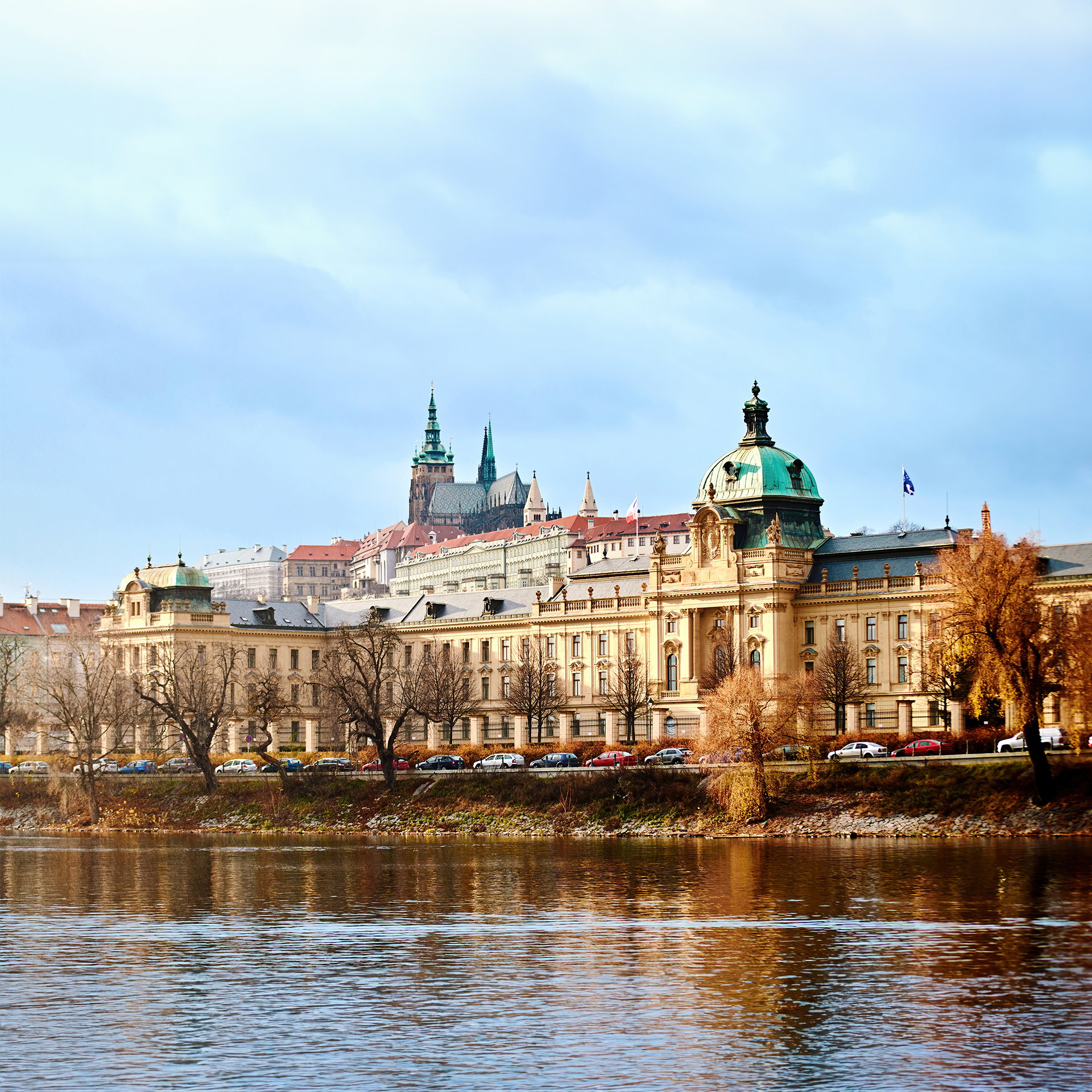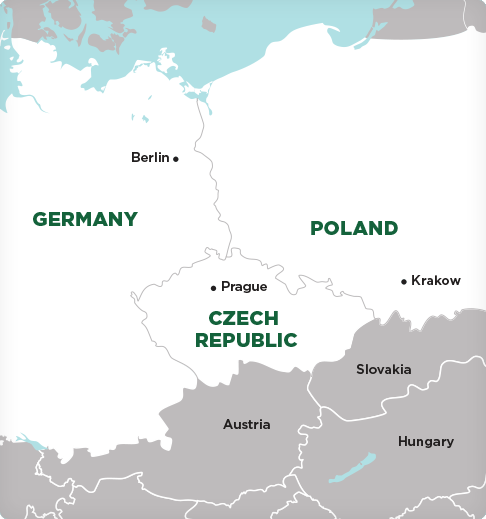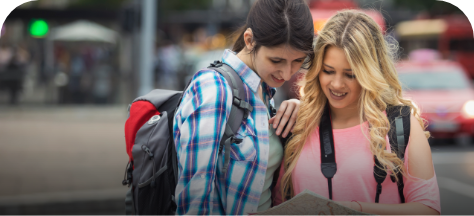Credits
16
Prerequisites
None
Language of Study
Czech
Courses taught in
English
Dates
Jan 27 – May 11
Program Countries
Czech Republic
Program Excursion Countries
Poland, Germany
Program Base
Prague
Critical Global Issue of Study
Geopolitics & Power

Examine the cultural politics and economics of refugee integration by engaging with resettlement organizations and refugee populations.
16
None
Czech
English
Jan 27 – May 11
Czech Republic
Poland, Germany
Prague
Geopolitics & Power
Refugees invoke hopes and concerns about economic, social, and cultural futures, as well as the impacts of mass population mobility on identity formation. This program addresses the social, political, and cultural transformations taking place in Eastern and Central Europe due to the mass migration of Syrian refugees that started in 2015 and, more recently, Ukrainian asylum seekers.
Investigate the ways refugees subvert the technologies that govern transnational mobility and interrogate the dominant narratives of the nation. Engage with the cultural politics and economics of refugee integration and the ethical limits of the “business of help.” Through site visits to refugee resettlement organizations and homestays in communities with refugee populations, you will learn about the importance of cultural and educational engagement for refugee integration. You’ll also reflect on potential solutions for the challenges faced by asylum seekers and the communities that support them.
Excursions to Poland and Germany provide an opportunity for a comparative analysis of how national political movements and refugee policies have affected the flow of refugees across Europe. You will also learn about the process by which refugees are supported and integrated into the cultures and economies of these nations.
None


Poland has been deeply affected by the influx of Ukrainian refugees than any other country in Europe. At the start of the war, more than seven million refugees fled to Poland, with more than 1.5 million choosing to settle there. In Krakow, where the population has surged by almost 25 percent, you will witness the impacts of this sudden population boom and learn how social workers, housing experts, educators, and local industries have quickly devised innovative solutions to resettle Ukrainians. You will also learn about Poland’s geopolitical position in Europe, which contributes to its development as a primary transit point for military and humanitarian aid cargo into Ukraine.
Germany has been a key destination for refugees in Europe, particularly following the significant influx of Syrian refugees in 2015. The country currently houses over one million asylum seekers from Ukraine. While in Germany, you’ll witness firsthand the impact of Germany’s “open-door” policy and the subsequent challenges and opportunities for refugee integration. During your visit, you’ll also explore the legal and institutional frameworks governing asylum and migration in Germany, including the role of the European Convention on Human Rights (ECHR) and the European Union (EU) directives in shaping national refugee protection systems. Through experiential site visits and discussions with refugees and community members, you’ll gain critical insights into the day-to-day realities of refugee integration in Germany.
Please note that SIT will make every effort to maintain its programs as described. To respond to emergent situations, however, SIT may have to change or cancel programs.
Upon completion of the program, students will be able to:
The following syllabi are representative of this program. Because courses develop and change over time to take advantage of dynamic learning opportunities, actual course content will vary from term to term.
The syllabi can be useful for students, faculty, and study abroad offices in assessing credit transfer. Read more about credit transfer.
Human Rights and Refugee Protection in Central Europe – syllabus
(INTS3500 / 3 credits)
This course examines the role of human rights law for refugee protection, with a focus on Central Europe. Starting from the history of international refugee protection, the 1951 Convention, and the 1967 Protocol, students will gain an understanding of the foundations and structure of international refugee law and human rights. Students will also analyze the historical, political, and social factors that have shaped migration patterns and policies in Central Europe, focusing on the experiences of refugees and asylum seekers in the Czech Republic, Poland, and Germany since 2015. Through case studies, guest lectures, and excursions to Poland and Germany, students will gain a critical understanding of the regime of refugee protection in Central Europe by highlighting its virtues and shortcomings, while developing the skills necessary to advocate for more just and equitable approaches to migration and refugee protection.
Refugee Integration and Cultural Transformation – syllabus
(INTS3000 / 3 credits)
The arrival of Syrian refugees into Europe in 2015 and, more recently, Ukrainian asylum seekers fleeing the conflict between Ukraine and Russia has re-centered debates on human rights, refugee protection, and the sustainability of social and cultural support systems for refugee settlement and integration. This course explores the complexities of refugee integration and cultural transformation in Central Europe, focusing on the social, political, and economic aspects of refugee resettlement. By contextualizing recent refugee arrivals within the larger framework of European Union (EU) migration policies and border regimes, students will critically examine the impact of EU directives, the rise of right-wing populism, and the role of civil society & local governments in promoting or hindering integration and belonging.
Research Methods and Ethics – syllabus
(ANTH3500 / 3 credits)
The Research Methods and Ethics (RME) seminar introduces students to conceptual and practical tools for developing and executing a research project on a topic of their choice. In this course, students gain the knowledge and skills essential to forming constructive and ethical relationships with organizations and/or individuals so that they can successfully complete an Independent Study Project in the Czech Republic. Students will learn about the complexities of conducting research with refugees and migrants, who often find themselves in precarious and vulnerable situations due to their uncertain status within their host countries.
Rather than simply classifying refugees as “vulnerable persons” based on Institutional Review Board (IRB) guidelines, the course seeks to approach the topic with empathy and a commitment to upholding the dignity of refugees by considering the ways in which refugees carry unique skills, knowledge, and perspectives on their home and host countries, which are critical to an understanding of the politics of human movement in the European Union. In this way, the course seeks to balance ethical considerations and compassion while also stressing the urgent need for research methods that allow refugees and migrants to share stories and ideas that contribute to a variety of human rights projects and initiatives.
Czech – syllabus
(CZEC1003 / 3 credits)
This course provides students with fundamental competency in Czech, with the main goals of assisting students to become competent in a number of communicative topics, introducing basic concepts and principles of Czech grammar, and introducing the language as an important mirror of Czech culture and society.
The course employs a variety of methods to achieve its objectives, including in-classroom sessions focused on conversational competence with relevant grammar-based instruction. Classroom sessions are combined with opportunities to practice language skills both in the language class field sessions on the streets of Prague and homework assignments to build conversational competencies.
Independent Study Project – syllabus
(ISPR3000 / 4 credits)
The Independent Study Project (ISP) is a self-designed research project offering students the opportunity to undertake a personally significant and independent investigation, which highlights the regional and cultural reality that can only be encountered during a study abroad experience. The ISP is the academic component in which the student most directly applies the concepts, skills, tools, and techniques of experience-based learning articulated through the Research Methods and Ethics course and the thematic courses, while enabling students to further integrate their language skills and the contacts they have developed in the homestay and in the broader community. Each student will plan, develop, and independently undertake a research project, with the advice and guidance of the academic director and an ISP Advisor. The topic of study may be anything of interest to the student, within the scope of the program and the immediate region, and is usually developed out of lectures, discussions, field visits, and educational excursions. The final project should provide material evidence of student capability in utilizing appropriate methodologies and in synthesizing experiences in the host culture. Students are expected to complete field-based research on their topic, submit a substantial written paper, and deliver an accompanying oral presentation. It is not uncommon for ISPs to strongly contribute to the student’s choice of subject for graduate studies or professional career.



SIT Study Abroad is committed to ensuring that international education is within reach for all students. We believe in the transformative power of immersive, intercultural experiences and are dedicated to supporting students in their educational journey.
See Full Breakdown
A critical step in preparing for your study abroad program is planning how you will maintain your health and wellbeing. Please review the following information carefully and contact [email protected] with any questions or concerns.
View Information